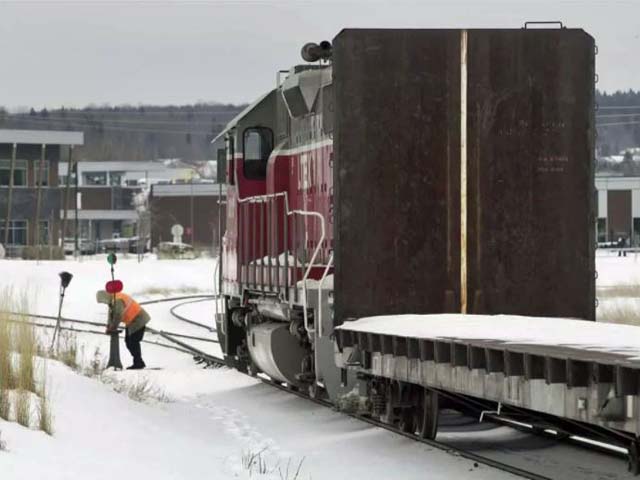
for Rail Detour
Lake Megantic Quebec - Like most of her citizens, Lake Megantic Mayor Julie Morin was not surprised Friday when a jury acquitted three former railway workers on criminal negligence charges in the 47 deaths that resulted when a runaway train carrying crude oil hurtled into the town's downtown core and exploded in July 2013.
The new mayor, who was elected in November, said she is relieved the trial is over so the town can move on.
But for Morin, one urgent step in moving on is getting the government to follow through on its promise to build a detour to the railway line.
Freight trains still come down a steep hill to a sharp curve in the middle of the town, as often as four times a day, some carrying hazardous materials.
"I am taking advantage of the visibility this verdict has given me to send a cry from the heart to our prime minister of Canada, to our premier in Quebec," she said in an interview in her office at Lake Megantic's city hall.
She stressed that she appreciates all the feasibility studies the government has financed, but as the five-year anniversary of the tragedy approaches, the time for studies is almost over and action is urgent.
The residents of Lake Megantic deserve a clear announcement soon on the budget for the construction of the long-awaited detour, she said.
She expressed frustration with the federal and provincial governments who seem to be "tossing the ball back and forth", she said.
She wants to sit down soon with officials from both levels to nail down a plan, well before the five-year anniversary of the tragedy.
"We know there were 18 factors that contributed to this accident, according to the report of the Transportation Safety Board (TSB). So we know very well that today, even though certain rail safety laws were improved, the hill between Nantes and Lake Megantic is still there. We also know that the railway line still curves in our downtown as well. So we absolutely need a detour for that rail line."
About half the town's downtown area was destroyed by the explosion and fire, and the other half had to be bull-dozed due to contamination.
Most businesses along the town's main street, Frontenac Street, have been relocated to the new extension of Papineau Street, or to the other side of a new bridge over the Chaudiere River.
But Morin said some development is still on hold, as the town waits to learn where and when the rail line will be relocated.
Even the town's memorial to the tragedy's victims is on hold.
Many of those who died on that terrible night were at the Musi-Cafe, enjoying one of that summer's first warm, clear, nights on the patio.
The memorial is to be built on the site of that cafe, but Morin said it is unthinkable to build it while the rail line still passes so close to the spot.
On Friday, after nine days of deliberations, three former employees of the now-defunct Montreal Maine & Atlantic Railway company (MMA), engineer Tom Harding, traffic controller Richard Labrie, and manager of train operations Jean Demaitre, were all found not guilty of criminal negligence causing death.
The train had been left at the top of the hill for the night, and the trial focused on whether reasonable safety standards had been applied.
The engineer had applied only some of the required hand brakes when he left the train for the night, and air brakes were disabled after a fire broke out on the train.
"I was not surprised by the verdict, as we were expecting it, but I am relieved," Morin said.
"Relieved because finally we have an answer after a long trial and a long jury deliberation. For us, who live in Lake Megantic, to see the images on television, to read the stories in the papers every day, to see over and over again those images of that tragic night of 6 Jul 2013, it becomes difficult at a certain point, not to fall back into it."
But she said her community is strong and resilient, and although some have moved away since the tragedy, many others who had moved away before the tragedy moved back home to help with the reconstruction and show solidarity.
"There is nobody in Lake Megantic who didn't know someone who died. I lost neighbours, I lost friends, no close family members, but it is still very upsetting. The whole community became kind of fragile. It really hit everybody that life is so fragile. It really shakes everything up."
She said the town will forever be traumatized by what happened, but there are some small glimmers of good that can be salvaged from the ashes.
"I wouldn't be comfortable saying there is any positive side to this, but now that it has happened, and we can't change it, we can't go back, it has given us a chance to rebuild in a different way, to plan the city better."
The town's population, she said, is still 6,000, about the same as it was before the tragedy.
"There are some people who had to leave town, who had health problems or (just could not stay), but there were also people who decided to get married, or to have children, or to start a business that they never would have dared to try but now they understand that life is short. It shook everything up. We have to try to make the best of whatever happens to us, and that's what we are trying to do here, every day."
Michelle Lalonde.
under the provisions in
Section 29 of the Canadian
Copyright Modernization Act.



